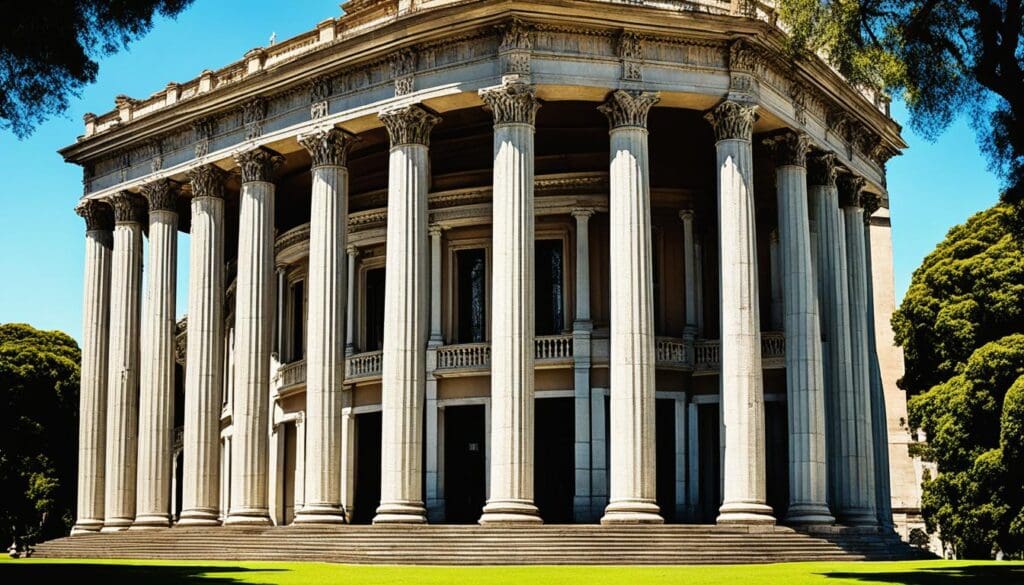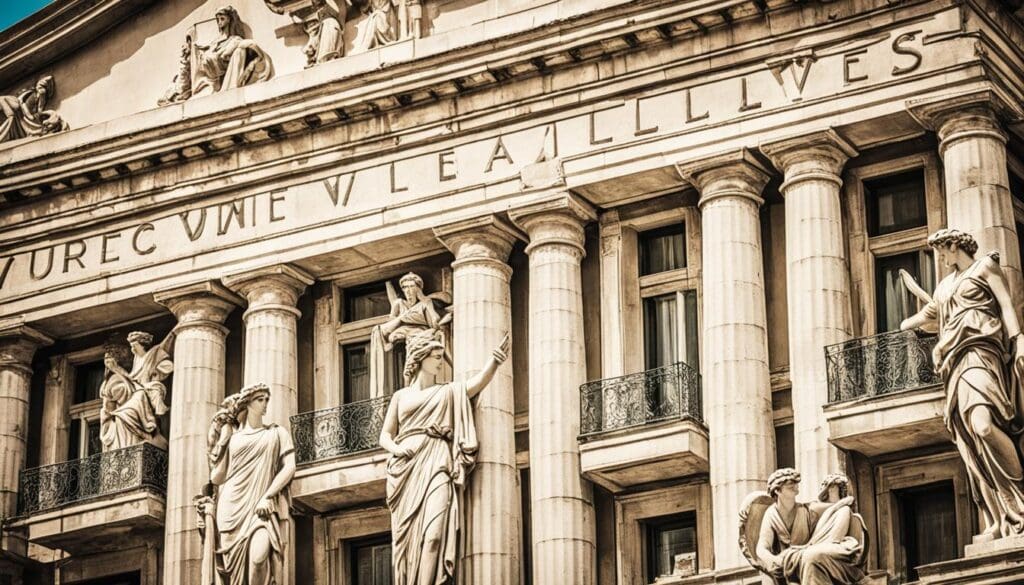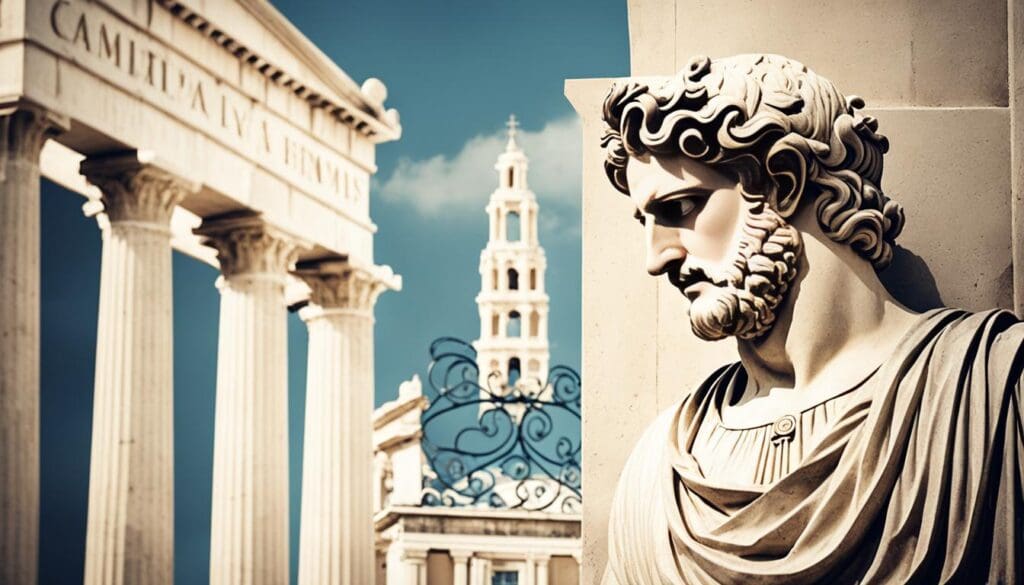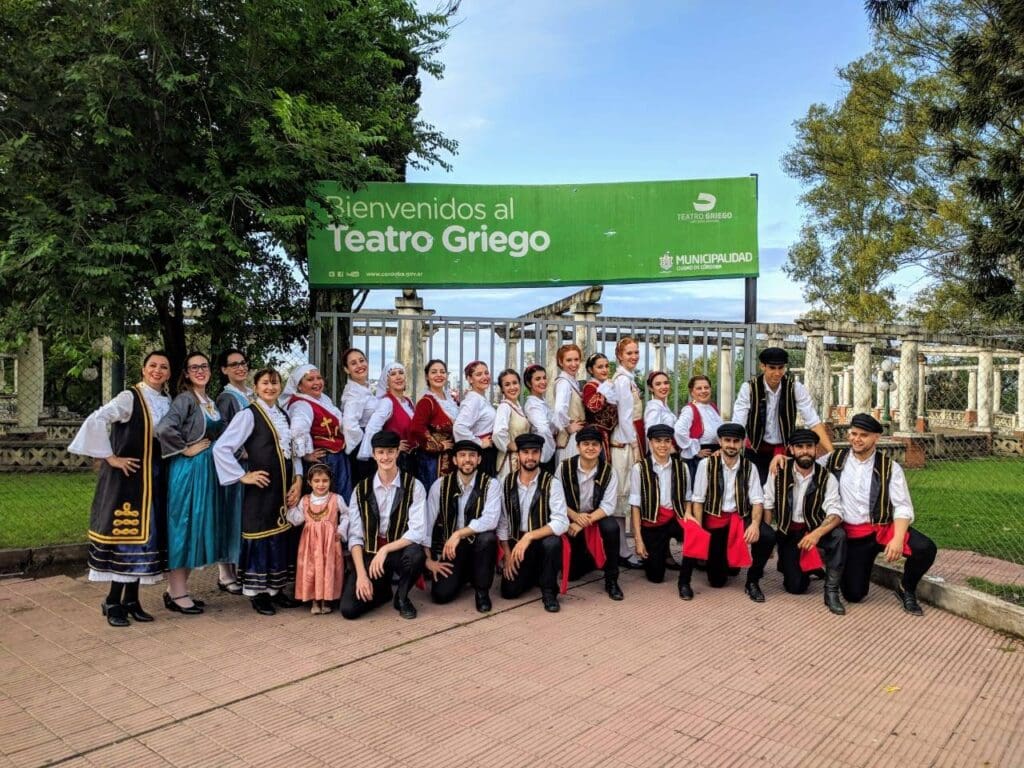Did you know that Buenos Aires, the vibrant capital of Argentina, is deeply influenced by the rich history and cultural heritage of Ancient Greece? From its architecture to its art and cultural traditions, the legacy of Ancient Greece can be seen throughout the city. Explore the fascinating connection between Buenos Aires and Ancient Greece as we delve into the history, landmarks, and cultural exchange that have shaped the city’s identity.
The influence of Ancient Greece in Buenos Aires goes beyond mere appreciation; it has left an indelible mark on the city’s architecture, making it a captivating destination for those seeking to immerse themselves in Greek culture. Join us on a journey through time and discover the enduring impact of Ancient Greece on Buenos Aires’ history, culture, and artistic traditions.
Table of Contents
- The Influence of Greek Architecture in Buenos Aires
- START YOUR SPANISH CLASSES TODAY
- Greek Art and Sculpture in Buenos Aires
- Cultural Exchange: Greek Festivals and Events in Buenos Aires
- Hellenic Symbols and Statues in Buenos Aires
- Educational Institutions and Greek Studies in Buenos Aires
- The Greek Orthodox Church in Buenos Aires
- Greek Cuisine and Culinary Influence in Buenos Aires
- Philhellenism and Intellectual Exchange in Buenos Aires
- Preserving and Promoting Ancient Greek Heritage in Buenos Aires
- Cultural Exchange Beyond Borders: Argentina and Greece
- Exploring the Hellenic Legacy in Buenos Aires
The Influence of Greek Architecture in Buenos Aires
Greek architecture has had a significant influence on the architectural landscape of Buenos Aires. The incorporation of Greek design elements can be seen in neoclassical buildings throughout the city, showcasing the lasting impact of ancient Greek architectural styles.
One of the most iconic landmarks in Buenos Aires that highlights this influence is the National Congress building. With its majestic facade featuring Greek columns, this neoclassical masterpiece stands as a testament to the city’s fascination with Greek architectural styles.
Another notable example is the Teatro Colon, one of the world’s most renowned opera houses. Adorned with intricate details and grandeur, this architectural gem features Greek-inspired motifs, including columns and decorative elements.
START YOUR SPANISH CLASSES TODAY
- University Spanish Courses in Argentina
- Spanish Classes in Malaga
- Learn Spanish in Milwaukee
- Profesores de ingles en Malaga
- Profesores de ingles en Buenos Aires
- Learn Spanish in Ottawa
- Spanish Courses in Toronto
- Learn Spanish Online
- Argentina Study Visa
- Coorporate Spanish Classes
- Spanish Immersion in Buenos Aires
Architectural Styles
The incorporation of Greek architectural elements in Buenos Aires is not limited to specific buildings but can be observed in different architectural styles. Neoclassical buildings, in particular, prominently feature Greek columns and design motifs.
The Greek column, with its distinctive fluted shaft and decorative capital, is a defining characteristic of neoclassical architecture in Buenos Aires. These columns, often used as structural supports or decorative elements, add a sense of elegance and timelessness to the city’s architectural landscape.
Greek architectural styles also extend to other architectural forms, such as public monuments and squares. These structures pay homage to Greek culture and history, serving as gathering places that celebrate the enduring legacy of Ancient Greece.
| Buenos Aires Landmarks | Architectural Style |
|---|---|
| National Congress Building | Neoclassical |
| Teatro Colon | Neoclassical |
| Monumento a los Españoles | Neoclassical |
| Plaza de Mayo | Public Square |
The image above showcases Greek columns in a neoclassical building in Buenos Aires, highlighting the influence of Greek architecture on the city’s landmarks.
The incorporation of Greek architectural elements in Buenos Aires not only adds to the city’s visual charm but also serves as a reminder of the cultural connections between Argentina and Ancient Greece. By preserving and celebrating these architectural styles, Buenos Aires pays homage to the enduring impact of Ancient Greece on its history and culture.
Greek Art and Sculpture in Buenos Aires
The artistic influence of Ancient Greece can be seen in the numerous museums and art collections in Buenos Aires. The city is home to a wealth of ancient Greek artifacts and sculptures, showcasing the beauty and craftsmanship of Greek art. Visitors can explore these collections and admire the exquisite works that reflect the artistic legacy of Ancient Greece.
One of the prominent museums in Buenos Aires that houses Greek art and sculptures is the Museo de Arte Griego (Museum of Greek Art). This museum showcases a remarkable collection of ancient Greek artifacts, including marble sculptures, pottery, and jewelry. The intricate details and masterful craftsmanship of these artifacts serve as a testament to the artistic prowess of ancient Greek civilization.


In addition to the Museo de Arte Griego, other museums in Buenos Aires, such as the Museo Nacional de Bellas Artes (National Museum of Fine Arts) and the Museo de Arte Latinoamericano de Buenos Aires (Museum of Latin American Art of Buenos Aires), also feature Greek artworks and sculptures in their collections. These museums provide a platform for both locals and tourists to appreciate and learn about the artistic influence of Ancient Greece.
Ancient Greek Sculptures in Buenos Aires Museums
| Sculpture | Museum |
|---|---|
| Diskobolos (Discus Thrower) | Museo Nacional de Bellas Artes |
| Aphrodite of Milos | Museo de Arte Latinoamericano de Buenos Aires |
| Kouros (Youth) | Museo de Arte Griego |
| Hermes and the Infant Dionysus | Museo Nacional de Bellas Artes |
These sculptures, among many others, highlight the artistic beauty and significance of Greek art. Visitors to Buenos Aires have the opportunity to witness these masterpieces up close and appreciate the skill and artistry that went into creating them. The presence of these ancient Greek sculptures in Buenos Aires museums demonstrates the enduring impact and appreciation of Greek art in the city’s cultural landscape.
Cultural Exchange: Greek Festivals and Events in Buenos Aires
The vibrant Greek community in Buenos Aires organizes various festivals and cultural events that celebrate Greek heritage. These events provide an opportunity for cultural exchange, allowing locals and visitors to immerse themselves in Greek traditions, music, dance, and cuisine. Through these festivals, Buenos Aires embraces the cultural diversity and influences brought by Ancient Greece.
One of the most prominent Greek festivals in Buenos Aires is the annual Greek Festival, which showcases the best of Greek culture, music, and culinary delights. Visitors can indulge in traditional Greek food, watch performances of Greek dances and music, and participate in various interactive activities. The festival creates an immersive experience that transports attendees to the vibrant streets of Greece.
Another notable event is the Greek Film Festival, where movie enthusiasts can enjoy a selection of Greek films ranging from classic masterpieces to contemporary works. The festival promotes cultural exchange through cinema, giving audiences a glimpse into Greek storytelling, cinematography, and perspectives.
The Buenos Aires Greek Community Center also hosts regular events and workshops that promote Greek culture and traditions. These events provide a platform for cultural exchange, allowing individuals from different backgrounds to learn about Greek customs, language, and history. The center offers classes in Greek language and dance, fostering a deeper appreciation for the rich cultural heritage of Greece.
Greek Festivals and Events in Buenos Aires
| Festival/Event | Date | Location |
|---|---|---|
| Annual Greek Festival | August | Greek Community Center |
| Greek Film Festival | October | Various venues |
| Greek Cultural Workshops | Ongoing | Buenos Aires Greek Community Center |
These festivals and events not only celebrate Greek culture but also foster a sense of community among the Buenos Aires Greek diaspora. They provide an opportunity for individuals to connect with their roots and share their traditions with the wider community.
The cultural exchange facilitated by these festivals enriches the cultural fabric of Buenos Aires, allowing for a deeper understanding and appreciation of the Greek heritage. It serves as a reminder of the enduring influence that Ancient Greece has had on the city’s history, art, and cultural identity.
Hellenic Symbols and Statues in Buenos Aires
Hellenic symbols and statues can be found in various public spaces across Buenos Aires, serving as a testament to the enduring influence of Ancient Greece. These captivating artworks pay homage to Greek mythology and historical figures, adding a touch of ancient grandeur to the cityscape. From statues of revered Greek gods and goddesses to monuments commemorating prominent philosophers and warriors, Buenos Aires is adorned with visual representations of the profound impact of Ancient Greece.
The presence of Hellenic symbols and statues in Buenos Aires is a celebration of Greek mythology and history. These captivating artistic expressions serve as a constant reminder of the city’s cultural and artistic ties to Ancient Greece, creating a unique fusion of past and present within its streets. Visitors and locals alike can appreciate the exquisite craftsmanship and beauty of these sculptures, while also delving into the captivating stories and legends that accompanied the figures they portray.


These statues and symbols can be found in prominent locations throughout the city, where they are cherished as reminders of Buenos Aires’ cultural heritage and its connection to Greece. Exploring the streets of Buenos Aires offers opportunities to encounter statues of gods such as Zeus, Poseidon, and Athena, among others. Monuments paying tribute to historical figures such as Plato, Aristotle, and Alexander the Great also dot the city, further reflecting the magnificence of Greek history and philosophy.
The interplay between Buenos Aires’ historical identity and the captivating allure of Ancient Greece is beautifully showcased through these statues and symbols. The profound impact of Greek mythology and historical figures not only enriches the city’s public art landscape, but also invites visitors to embark on a journey through time, exploring the cultural, artistic, and intellectual significance of Ancient Greece.
Educational Institutions and Greek Studies in Buenos Aires
Buenos Aires offers a range of educational institutions that provide opportunities to study Greek language, history, and culture. These institutions play a vital role in preserving and promoting the rich heritage of Ancient Greece.
Universities in Buenos Aires offer academic programs and courses dedicated to Greek studies, allowing students to immerse themselves in the fascinating world of ancient Greek civilization. Through these programs, students can explore Greek history, philosophy, literature, and art, gaining a deeper understanding of the cultural contributions of Ancient Greece.
Language schools in Buenos Aires also offer Greek language courses, providing students with the opportunity to learn this ancient and influential language. By studying Greek, students can unlock the secrets of classical texts and engage with the works of renowned philosophers, poets, and playwrights.
Universities Offering Greek Studies Programs:
- University of Buenos Aires
- University of Belgrano
- University of Salvador
- University of Palermo
Language Schools Offering Greek Language Courses:
- Buenos Aires Language School
- Spanish in Buenos Aires
- Expanish
- Academia Buenos Aires
The Greek Orthodox Church in Buenos Aires
The Greek Orthodox Church holds a significant place within the Greek community in Buenos Aires. The city is blessed with several Greek Orthodox churches that showcase intricate architectural details, embodying the religious practices and traditions brought by the Greek diaspora. These churches serve as both places of worship and cultural gathering centers for the Greek community, fostering a stronger sense of identity and connection.
The Greek Orthodox Church is characterized by its distinctive design elements, which reflect the rich history and spiritual significance of the Greek Orthodox faith. These architectural marvels often feature domes, intricate mosaics, and ornate artwork, creating a serene and reverent atmosphere for worshippers. The religious institutions continue to play a crucial role in preserving and promoting Greek traditions, values, and cultural heritage.
One notable example is the Ascension Greek Orthodox Cathedral, situated in Buenos Aires. This magnificent church stands as a symbol of the enduring faith and devotion of the Greek community. Its architectural beauty and spiritual significance attract not only the faithful but also visitors interested in exploring the religious and cultural aspects of Buenos Aires.
Greek Orthodox Church in Buenos Aires
- Location: Buenos Aires, Argentina
- Architectural Style: Greek Orthodox
- Cultural Significance: Center of worship and cultural gatherings for the Greek community
- Features: Intricate architectural details, domes, mosaics, ornate artwork
The Greek Orthodox Church’s presence in Buenos Aires is a testament to the unity and resilience of the Greek community, as well as the city’s appreciation for diversity and cultural exchange. Through its religious institutions, Buenos Aires proudly showcases the enduring influence of the Greek diaspora and its lasting impact on the city’s religious architecture and traditions.
| Greek Orthodox Church | Location | Architectural Style |
|---|---|---|
| Ascension Greek Orthodox Cathedral | Buenos Aires, Argentina | Greek Orthodox |
| St. Dimitrios Greek Orthodox Church | Buenos Aires, Argentina | Greek Orthodox |
| St. Nicholas Greek Orthodox Church | Buenos Aires, Argentina | Greek Orthodox |
These Greek Orthodox churches in Buenos Aires stand as majestic tributes to the faith, history, and cultural heritage of the Greek community. Their architectural splendor and importance within the Greek diaspora make them both spiritual and cultural landmarks, attracting visitors who seek to explore the religious and historical significance of Buenos Aires.
Greek Cuisine and Culinary Influence in Buenos Aires
Greek cuisine has become an integral part of the culinary scene in Buenos Aires, offering a delightful fusion of Mediterranean flavors and Greek traditional dishes. The city boasts a wide variety of restaurants and cafes that showcase the rich culinary traditions of Ancient Greece, tantalizing the taste buds of locals and visitors alike.
When dining in Buenos Aires, you can savor classic Greek dishes such as moussaka, a hearty casserole made with layers of eggplant, ground meat, and béchamel sauce. Another favorite is souvlaki, tender skewered meat usually served with pita bread and tangy tzatziki sauce. These dishes exemplify the harmonious combination of fresh ingredients, aromatic herbs, and spices that define Greek cuisine.
For those with a sweet tooth, Buenos Aires offers delectable traditional Greek pastries like baklava, a flaky pastry filled with nuts and sweet syrup. You can also indulge in loukoumades, deep-fried dough balls drizzled with honey and sprinkled with cinnamon.
To fully immerse yourself in the Greek gastronomic experience, head to one of the many restaurants that specialize in Greek cuisine. These establishments not only serve authentic Greek dishes but also create a warm and inviting ambiance that transports you to Greece. Enjoy a leisurely meal while surrounded by Mediterranean-inspired décor and friendly hospitality.
Must-Try Greek Restaurants in Buenos Aires
- Vandalia: This popular restaurant offers a modern twist on Greek classics, combining traditional flavors with innovative culinary techniques. Don’t miss their mouthwatering gyros and fresh Greek salads.
- Mykonos: Known for its warm and welcoming atmosphere, Mykonos serves up traditional Greek dishes bursting with flavor. Their moussaka and spanakopita are highly recommended.
- Tzatziki: A hidden gem tucked away in the heart of Buenos Aires, Tzatziki delights diners with its authentic Greek recipes and friendly service. Try their souvlaki and horiatiki salad for a true taste of Greece.
Exploring the Greek cuisine in Buenos Aires is a culinary journey that allows you to experience the rich flavors and diverse culinary heritage of Ancient Greece. Indulge your senses and embrace the Mediterranean spirit as you savor the delicious dishes crafted with passion and tradition.
Philhellenism and Intellectual Exchange in Buenos Aires
Buenos Aires has a long-standing tradition of embracing Philhellenism, a deep love and admiration for Ancient Greece. The city’s intellectual community thrives on intellectual exchange and the study of Greek philosophy, which continues to shape the cultural landscape of Buenos Aires.
Academic discussions, philosophical debates, and literary pursuits are integral to the intellectual fabric of Buenos Aires. Scholars and intellectuals engage in rigorous intellectual exchange, drawing inspiration from the profound wisdom and ideas of Ancient Greek philosophers.
Philhellenism: A Cultural Appreciation
Philhellenism transcends the realm of academia and permeates various aspects of Buenos Aires’ society. Intellectuals, artists, and cultural enthusiasts embrace the principles and values that were central to Ancient Greek civilization.
- Hellenic-inspired art: Paintings, sculptures, and other artistic creations pay homage to the aesthetics and artistic traditions of Ancient Greece.
- Philosophical discourse: Philosophical societies and gatherings provide intellectual forums for individuals to discuss and explore Greek philosophical concepts.
- Literary pursuits: Writers and authors incorporate elements of Greek mythology, history, and philosophy into their literary works, fostering a deep appreciation for Greek literature.
Through these various avenues, the Buenos Aires intellectual community engages in a constant dialogue with the intellectual legacy of Ancient Greece, fostering a culture of curiosity, critical thinking, and appreciation for the pursuit of knowledge.
Intellectual Exchange and Cultural Enrichment
The intellectual exchange in Buenos Aires transcends borders, attracting scholars and thinkers from around the world. The city serves as a hub for academic conferences, lectures, and symposiums, where Greek philosophy takes center stage.
Buenos Aires’ intellectual community actively seeks to deepen its understanding of Greek philosophy and its relevance to contemporary society. By engaging in intellectual discourse, scholars and intellectuals in Buenos Aires contribute to the global understanding and interpretation of Greek philosophy.
This intellectual exchange not only enriches the cultural landscape of Buenos Aires but also fosters connections and collaborations with international scholars, promoting a global appreciation for the intellectual legacy of Ancient Greece.
The Influence of Greek Philosophy
Greek philosophy continues to inspire critical thinking, ethical inquiry, and the pursuit of knowledge in Buenos Aires. The philosophical principles and teachings of Ancient Greek philosophers such as Socrates, Plato, and Aristotle resonate with the intellectual community and shape their perspectives.
From students studying philosophy at prestigious universities to intellectuals engaging in philosophical debates at local gatherings, Greek philosophy is a driving force in the intellectual pursuits of Buenos Aires.


The teachings of Greek philosophers have enduring relevance, offering insights into ethics, politics, metaphysics, and various other realms of knowledge. Through the study and contemplation of Greek philosophy, Buenos Aires continues to foster a culture of intellectual curiosity and exchange.
Preserving and Promoting Ancient Greek Heritage in Buenos Aires
In Buenos Aires, dedicated efforts are underway to preserve and promote the rich heritage of Ancient Greece. The city recognizes the historical and cultural significance of this ancient civilization and strives to protect its legacy for future generations.
Historical and archaeological sites throughout Buenos Aires are carefully safeguarded, providing visitors with the opportunity to explore the traces of Ancient Greece embedded within the city’s landscape. These well-preserved sites offer a captivating glimpse into the past, allowing for a deeper understanding of Buenos Aires’ connection to this influential civilization.
Organizations and institutions play a crucial role in the preservation of cultural heritage in Buenos Aires. Through their endeavors, the legacy of Ancient Greece remains a vital and celebrated part of the city’s identity. These dedicated entities work tirelessly to ensure that the profound impact of Ancient Greece is not lost but continues to inspire and enrich the cultural fabric of Buenos Aires.
Significance of Heritage Preservation:
The preservation of Ancient Greek heritage holds immense cultural and historical value. By safeguarding historical sites and artifacts, Buenos Aires ensures the lasting relevance of Ancient Greek contributions to society and human civilization. This preservation effort also serves as a testament to the interconnectedness of cultures and the enduring legacy of Ancient Greece.
Archaeological Sites in Buenos Aires:
Buenos Aires boasts several notable archaeological sites that bear witness to the city’s ties with Ancient Greece. These sites provide invaluable insights into the architectural, artistic, and societal aspects of this influential civilization.
- The Roman Theatre of Buenos Aires: A well-preserved theater dating back to the 1st century, showcasing the influence of Ancient Greek theater.
- The Greek Quarter: A vibrant neighborhood adorned with Hellenistic-inspired architecture and structures reminiscent of Ancient Greece.
- The Ethnographic Museum: Home to a remarkable collection of artifacts from Ancient Greece, offering visitors a comprehensive understanding of the culture and daily life of the ancient Greeks.
Cultural Preservation Initiatives:
Buenos Aires is dedicated to preserving the cultural heritage of Ancient Greece beyond archaeological sites. Cultural institutions, such as museums and educational centers, play a vital role in showcasing the artistic, philosophical, and intellectual legacy of this ancient civilization.
These institutions offer a range of programs, exhibitions, and educational initiatives that aim to promote a greater understanding and appreciation of Ancient Greece. By preserving and promoting this rich cultural heritage, Buenos Aires provides locals and visitors alike with the opportunity to engage with the fascinating world of Ancient Greece.
Cultural Exchange Beyond Borders: Argentina and Greece
The cultural exchange between Argentina and Greece extends beyond the borders of Buenos Aires, forging connections through artistic collaborations, exhibitions, festivals, and cultural events. Through these interactions, both countries deepen their understanding and appreciation of each other’s cultural heritage, fostering a stronger bond between Argentina and Greece and showcasing the enduring impact of Ancient Greece in contemporary society.
Artistic Collaborations
Artists, musicians, and performers from Argentina and Greece come together to create innovative and inspiring works that transcend borders. Their collaborations result in exhibitions, concerts, and performances that celebrate the fusion of artistic expression from both cultures. By merging different artistic traditions and perspectives, these collaborations contribute to the global cultural scene and promote dialogue and understanding.
Cultural Diplomacy
Through cultural exchanges, Argentina and Greece engage in diplomatic efforts to strengthen bilateral relations. These interactions serve as platforms for constructive dialogue, fostering mutual respect and appreciation for each other’s cultural identities. By promoting cultural diplomacy, Argentina and Greece establish lasting connections that go beyond political and economic ties, fostering mutual understanding and respect.
International Festivals and Events
International festivals and events provide opportunities for Argentina and Greece to showcase their cultural heritage to a global audience. Whether it’s a film festival, a music concert, or a culinary showcase, these events bring together artists, performers, and enthusiasts from both countries. The exchange of ideas and experiences at these festivals and events enriches the cultural landscape and promotes cross-cultural dialogue and exchange.
| Benefits of Cultural Exchange between Argentina and Greece |
|---|
| 1. Promotion of cultural diversity and mutual understanding |
| 2. Enhancement of bilateral relations and cooperation |
| 3. Enrichment of artistic expressions and traditions |
| 4. Exchange of knowledge and ideas |
| 5. Strengthening of cultural diplomacy |
Through cultural exchange, Argentina and Greece build bridges that transcend geographical boundaries, fostering collaboration, understanding, and appreciation. These enriching connections contribute to the global cultural tapestry, uniting Argentina and Greece through shared artistic expressions and celebrating the enduring legacy of Ancient Greece.
Exploring the Hellenic Legacy in Buenos Aires
Visitors to Buenos Aires have countless opportunities to explore the Hellenic legacy that permeates the city. Steeped in history and influenced by ancient Greece, Buenos Aires offers a unique cultural exploration for those interested in immersing themselves in the city’s vibrant heritage.
One of the highlights of exploring Buenos Aires is witnessing the exquisite ancient Greece landmarks that adorn the city. From neoclassical buildings with Greek columns to statues paying homage to Greek mythology, these architectural gems transport visitors back in time and showcase the enduring influence of Ancient Greece in the city’s aesthetic.
Furthermore, cultural enrichment can be found in Buenos Aires through its numerous museums and art collections. These repositories house a wealth of ancient Greek artifacts, sculptures, and artwork, allowing visitors to appreciate the intricate craftsmanship and beauty of Greek art. By exploring these collections, one can gain a deeper understanding of how the artistic traditions of Ancient Greece have shaped Buenos Aires’ vibrant artistic scene.
As visitors explore this magnificent city, they can also indulge in the culinary delights of Greek cuisine. Buenos Aires boasts a thriving culinary scene with numerous restaurants that offer a taste of Greece’s traditional dishes. From moussaka to souvlaki, each bite immerses visitors in the flavors and culinary traditions that have been passed down through generations.




